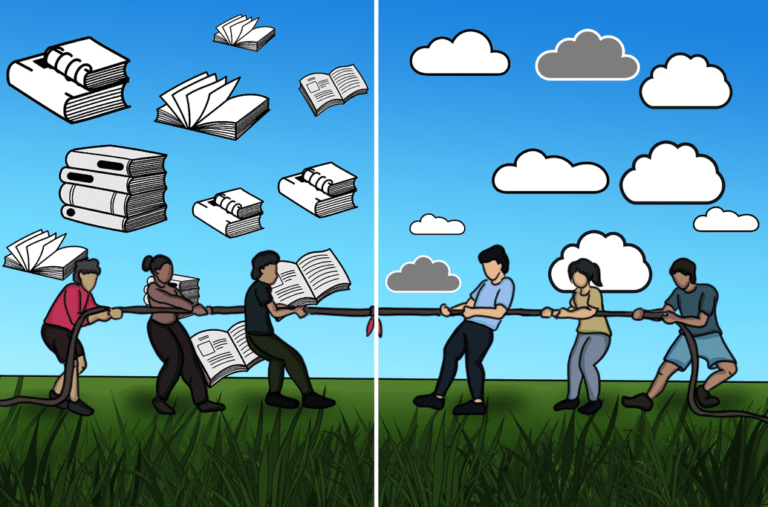Teachers – Nourishers in the age of Data!

This post is contributed collectively by the four authors
(This is article is the first in a 3 part series on ‘Nourishers in Our Lives – What They Leave Us With & What We Give Back?’ The remaining two would be published in the coming days)
Nourishing
It was in a cab ride involving two newbie teachers that this conversation on nourishing came up. As a young “fresh off the boat” teacher, I was trying to understand how I should be approaching my profession in such changing times. In a bid to publish incessantly, network and attend conferences and be visible, does it matter that the teachers are investing a lot of time in the students? There was an issue of a suicide this semester in the University. Multiple students have come up with mental problems ranging from anxiety in presenting in front of the class of not being able to wake up in the mornings because something is weighing hard on them. Teachers like me shy away from taking that added responsibility because we do not want “unnecessary” trouble.
Firstly, we do not feel competent to help our students in cases where they are dealing with family issues or relationship issues or addiction. Secondly, do the students value teachers who spend time and show empathy or do they look for teachers who are stalwarts in their field of expertise? As consumers of education, do they just want great brand names that can give great recommendation letters for their Ivy league applications and help them connect with people in the industry? Thus, as teachers we distance ourselves from the student’s personal issues and we focus on our professional commitments.
Growing up in a world not infested by the deluge of data and distractions, some of us may be able to recall teachers who inspired us to become who we are now. To punch above our weight in the bouts of life and not be bogged down by unknown jabs. To us, they were not simply people who taught us algebra, respiratory system or Indian constitution, but important life lessons that will later shine like streetlights as we move from one milestone to the next. They didn’t simply teach us to consume information but to reflect, romance and make something our own with it. We can now call them nourishers of our lives.
Fast forward – present day!
‘Nourishing’ has become a word that we associate more and more with face packs, body lotions and less as a quality we see in people around us. One can define nourishers as people who have the capability to help us become better versions of ourselves. They may come in many different forms and names – friends, mentors, parents and relationships. Like rain on a hot day, we are re-energised by them when we need them the most. Yet it is perplexing that we can’t quite quantify what value they add. In a world where every decision taken is analysed, the value of every action taken is quantified, nourishers remain the most invaluable asset.
A generation of nourisher-teachers have been disappearing into the abyss marked as technically incompetent. Students have become customers, classes have become a service and classrooms have become a marketplace. In this data-driven marketplace, publications of a teacher have become the gold standard for their service and their quality. ‘Publish or perish’ has become the new mantra. Teachers have become supervisors that create market value in unfinished human products by chopping off what doesn’t fit in. We have conveniently forgotten the soul of teaching in these marketplace transactions.
The irony is that even as the community of teachers adapt themselves to make their teaching skills market ready, they face their toughest competition from the internet. In a constantly evolving world of learning where technology was envisioned as a partner to aid the process, it is now taking the role of a competitor to teachers. Modern day teachers are competing with Google-s, Udemy-s and Coursera-s of the world. But as the famous chess master Bobby Fischer says, “Nothing is as healing as the human touch,” the role of a teacher giving the finishing touches to students cannot be replaced in the near time. The emotional quotient and understanding part is what makes the student a finished product to deal with the world outside.
Resetting the goalpost
To achieve this, as a community we need to rethink and reset goals for our teachers and update the ways to measure it. The goal of a teacher is to move from information providers to facilitators in finding ways to identify relevant information, identifying the true from false information, analysing it to find meaningful insights, and applying it to solve problems. This ensures that a generation of students are trained to become problem solvers who would be in demand considering the socio-economic crises we are facing.
Teachers can provide opportunities for students to share life experiences with other students so that each of them identify and acknowledge their socio-economic privileges. A system of open and honest dialogue ensures that every new idea or an action taken upon them will always be mindful of the requirements of the underprivileged. Teachers can be custodians of local culture and heritage by helping the students develop a love for languages. Their interventions to promote local language can have a huge impact on the education system, as found in the case of Finnish education system. In Finland, heavy emphasis on learning the local language and the decision to continue the local language as the medium of instruction have allowed students to improve their self learning and critical thinking skills.
Through this exercise, teachers would be building a pipeline of students who are equipped to make informed decisions in their life. As the first step to making informed choices, students will start asking questions to satisfy their curiosity. Teachers become their partners in finding answers and it takes the shape of a peer mentorship. This activity need not always be a one-on-one affair. It can also be a group of teachers coming together from various backgrounds to guide the student to provide a multi-dimensional educational experience technically known as mosaic mentoring or co-teaching. The idea of co-teaching is now made simpler and real time with the advent of internet and smartphone app based platforms. Duplication of work, sharing of successful classroom management strategies, identification of weak students will become far easier than before. Thus, co-teaching helps teachers to balance their efforts to nourish the values and skills in students whilst balancing the grades of the students required for them to build a career.
Right measurements
“You can’t manage what you can’t measure”
Peter Drucker (Management Guru)
It’s time for a change in the way we perceive as the ideal output of a successful teacher and how we measure teacher’s performance. We must begin by setting the right goal posts. The short term assessment of a teacher should be based on the positive psychological impact teachers have on students, level of inspiration she can provide and level of engagement she is able to provide in the class and so on. Medium to long term audit should be carried out to find out how those students lived up to their potential, becoming the best they could be.
It is time we find out for ourselves how much value nourishers add, how they’ve evolved, where they stand in the social hierarchy and ways in which we can better appreciate their contributions! We should also explore ways in which we can encourage more nourishers in the teaching community and reinvent their roles in a data-driven world. We need to envision a new approach to position our teachers so that the soul of teaching is not lost in an age where data is the new currency.
Citizens should rise up and voice their need to have nourishers amongst them as they are fountainhead of all democratic virtues we abide by. In the near future, as we hold the hands of our little ones and march their way into schools and learning centres, can we dare to expect these institutions to be makers of better human beings or an assembly line of future heartless professionals!
Featured Image Credits: Sri Harsha Dantuluri









As an educationist, i love to read this article. Wish to see more from you all.